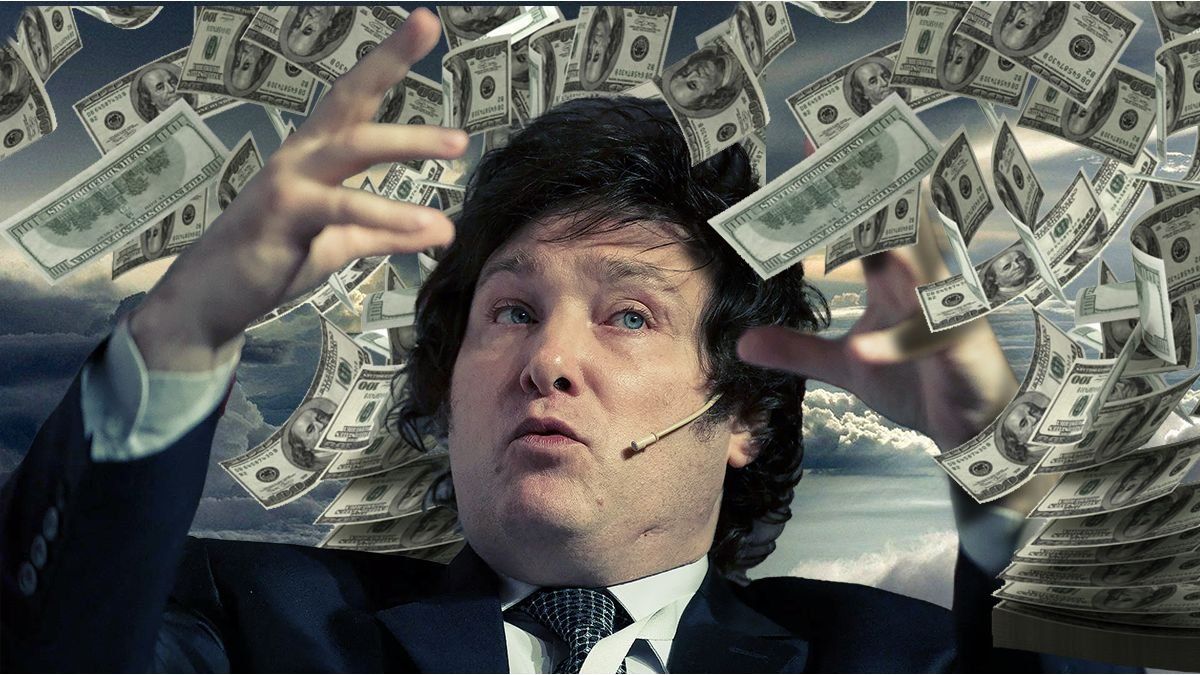The Córdoba economist has already told the president that only in this way will he be able, at the beginning of next year, to blow up the exchange rate trap and implement a stabilization plan, something similar to the 1991 convertibility plan.
Just in case, Cavallo offered Milei several exit alternatives for what would be an “ethics” of the unfulfilled political promise. He told him that from the “instrumental” point of view, dollarization can mean the total replacement of pesos in circulation for dollars, but the system of coin competitionsomething similar to what happens in Peru.
What is Cavallo thinking? Answer: what the Caputo-Milei plan You could end up halfway, not raise enough dollars, and that would be the worst case scenario. In translation, it would imply the panic of running out of dollars in order to dollarize. For this reason, the council adds another additional recommendation: to dollarizing does not require net reserves equivalent to all the monetary liabilities of the Central Bank.
Cavallo told Milei that it is possible to dollarize, in the sense of giving freedom of choice of currency, when the Central Bank has managed to recover reserves equivalent to the legal reserves of dollar deposits in the banking market and is in a position to return those deposits if their holders require it.
Let them say it, better
Cavallo’s words do not fall on deaf ears. The Government is committed to taming the inflation expectations but, above all, it seeks the metamorphosis of these expectations into a series of arguments that could alleviate – in consciences, not in pockets – the inclemencies of the adjustment. If inflation does not fall, at least the counterfactual of “we avoid hyperinflation, etc.”
So you understand what happened this week. As Ámbito anticipated, The IMF Board approved the seventh staff review, releasing US$4.7 billion that allowed the immediate repayment of a good part of that figure. But perhaps the most important thing is what was known later, the document that “releases” the IMF and that gives an account of the Government’s promises to the organization. This is where Cavallo’s recommendation is included: we have to promise what we still don’t know exactly what it will be like. The end of the stocks. Exchange unification. The decline in inflation. In this aspect, the IMF is a kind of oral court, which would be giving legitimacy to a promise in the air. Georgieva says what Milei says what Caputo says.
As always, and regarding the forces of heaven, an infamous demon is an angel lost in darkness. The repression of recent days against Congress and the half-sanction of the Law Bases – for now in general – would be part of the same scene, a series of signals to the markets and the IMF that, this time, things are serious. In fact, there are those who are skeptical of the parliamentary discussion and even of the delays in the Law.
They simply want to see how much of the financial, monetary and exchange measures can advance. They distrust the tax issue. The promise of public accounts in order, these “analysts” say, makes no sense until monetary imbalances are stopped and the Central Bank is put in order. There is something at stake there. A thin thread of doubts and opacity runs through the entire sequence described: Cavallo, the IMF, the discussion of the Law, the Bases. As if what was really at stake was something else.
Dollar versus inflation
The president of the Central Bank, Santiago Bausili embodies today the nerve center of management. Bausili is in charge of adding dollars, perhaps the first of the needs that the Casa Rosada faces (it has increased reserves). There is no paradise without dollars. Nor a stabilization plan.
Much less governance. The Central Bank needs to be given a “high dollar.” Allows you to add reservations quickly via the commercial balance. Also pay the debt. But at the same time, it needs a quiet dollar to lower inflation expectations, a monolith that moves at 2% monthly while inflation is ten times more important. He understands that the promise of fiscal balance, Milei’s selfie with Georgieva and the orthodox recipe for economic depression are not going to be enough to stop inflation. She is an omnipresent dilemma in every analysis. It is a problem in the best philosophical style.
The Casa Rosada and Minister Caputo fuel the inflation to clean up the balance sheet of the Central Bank liquefying debt and public spending (Treasury), but at the same time that inflation plays against expectations. In other words, the inflation promoted by the Government would not be the best to lower the inflation that the Government supposedly seeks. That’s why everyone looks to the Central Bank.
In this scheme, there are many who guess that the end of the road is the dollarization, a natural reaction of all those who can only have pesos in their pockets. Workers, retirees, informal workers, all those who have their contracts in local currency are the ones who pay and will pay the ticket for the ongoing adjustment.
The race and the deadline blender
This is where it comes back to thread the idea of dollarization. If the inflationary liquefaction does not stop, it is likely that the fiscal adjustment will end up deepening the economic recession, which would generate lower revenue with the consequent failure to meet the goal of zero financial deficit. President Milei knows this. What’s more: his old advisor, the alchemist Emilio Ocampo, had told him so. It is preferable to carry out the monetary reform first (dollarize) and then seek to balance public accounts. This would begin a cycle of lower inflation and not the other way around.
What would be underway is some of all of this. Caputo’s promise to Milei, dollarize in the least dramatic way, It is struggling with the problems of inflation and the speed of adjustment. Seen in this way, a rapid reaction by the unions – monthly joint unions, for example – would put at risk the dominance that the Government has.
On the one hand, Milei has liquefied the debts in pesos of the Central Bank that the banks had, which in turn lowered the rate for deposit holders and depositors. Through devaluation, they are now betting on Bopreal (debt in dollars) to resume imports from the main companies and soften the landing of economic activity. Will a new devaluation be necessary? Cavallo thinks so. That the “competitiveness” gained with the devaluation was lost very quickly.
This is also where the game is played: the coming months will bring a strong adjustment of purchasing power, a strong increase in the cost of living but does not predict a reduction in inflation. With an economy that could decline more than the predicted 2 or 3%, the question is what degree of patience will the average citizen have, especially the middle class that accompanied Milei at the polls. With unemployment, high inflation, meager wages and the expectation of greater future adjustment, the promise of dollarization could act as a palliative. In two or three months we will know.
Source: Ambito
David William is a talented author who has made a name for himself in the world of writing. He is a professional author who writes on a wide range of topics, from general interest to opinion news. David is currently working as a writer at 24 hours worlds where he brings his unique perspective and in-depth research to his articles, making them both informative and engaging.




